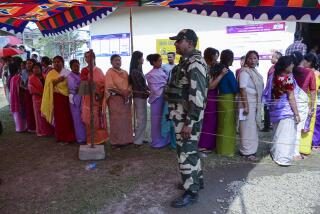Foes of Bangladeshi victor call vote ‘farcical’
An alliance led by former Prime Minister Sheik Hasina Wajed won a landslide victory in Bangladesh’s first election in seven years, officials confirmed Tuesday amid hopes that her strong mandate will help restore democracy and political stability to the troubled nation.
Wajed’s secular Awami League, which won 260 of the 300 seats in parliament, is expected to form a government. The predominantly Muslim country’s 150 million people have been under army-backed rule since early 2007.
Even before the results of Monday’s election became clear, rivals led by former Prime Minister Khaleda Zia accused Wajed’s group of vote buying and dirty tricks.
In a televised news conference, Zia said, “It is a farcical election,” the Associated Press reported.
The charges raised the specter of a return to the divisive accusations, work stoppages and street demonstrations that have made it difficult at times for leaders to govern effectively.
Reuters news agency said one person was killed and 150 injured in clashes between rival factions in the Pabna area of western Bangladesh.
“The opposition may not accept the election,” said Ataur Rahman, a professor at the University of Dhaka. “That could jeopardize parliamentary government. We want a more meaningful democracy and a functioning parliament, but that might not take place.”
Thousands of observers, including many foreigners, monitored the balloting.
Analysts attributed the lopsided victory to Wajed’s promises to alleviate poverty, her alliance’s better political organization and a desire for change in the wake of Zia’s 1991-96 and 2001-06 administrations.
“Many people voted [for] Hasina out of pent-up resentment over Khaleda’s alleged misrule and corruption,” said Abdul Aziz, 48, headmaster of a high school in Chittagong.
On election day, authorities deployed more than half a million soldiers and police officers to prevent violence in a nation with a history of political unrest.
“I feel proud to cast my vote in such a festive and free atmosphere,” Jashim Uddin, 55, owner of a pharmacy in Chittagong, said shortly after voting. “We want to see an end to violence and terrorism. . . . In the past, we’ve had to give payoffs to local political activists just to run a business or do other things in society.”
But some were doubtful that the country’s long history of social and political corruption could be easily reversed. Transparency International, a Berlin-based independent watchdog group, ranked Bangladesh 147th among 180 countries in its 2008 corruption- perception index. (Denmark, at No. 1, was seen as the least corrupt.)
Wajed and Zia both served time in prison recently on corruption charges, though each has denied wrongdoing and said her detention was politically motivated.
Others disagree.
“Both sides are equally corrupt,” said Golam Hossain, a professor at Jahangirnagar University in Dhaka, the capital.
Over the weekend, 85 people in three districts were hurt during clashes between supporters of the two archrivals, United News of Bangladesh reported.
Analysts said Wajed has an opportunity to learn from the mistakes she made during her 1996-2001 term as prime minister, but they expressed concern that voters’ high expectations could turn to anger if she doesn’t deliver soon on promises to improve the lives of citizens.
The prospect for instability also raised concern that the military could step in again.
“It is difficult to rule out the possibility of the army taking over if there’s massive mismanagement or public unrest during Hasina’s tenure,” said Rahman, the University of Dhaka professor.
--
More to Read
Start your day right
Sign up for Essential California for news, features and recommendations from the L.A. Times and beyond in your inbox six days a week.
You may occasionally receive promotional content from the Los Angeles Times.






